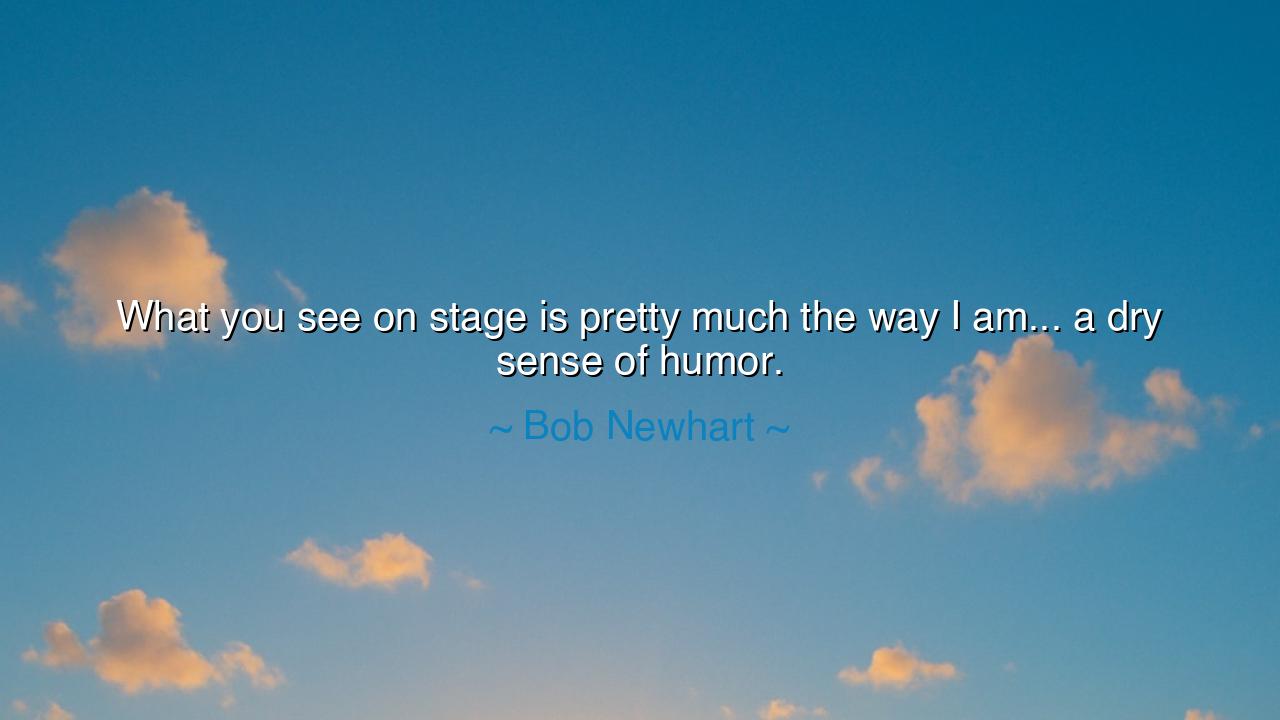
What you see on stage is pretty much the way I am... a dry sense






When Bob Newhart said, “What you see on stage is pretty much the way I am... a dry sense of humor,” he was not simply describing his comedic style — he was declaring a philosophy of life. His words carry the quiet wisdom of a man who found truth not in grand gestures, but in authenticity. In a world where many hide behind masks to entertain or impress, Newhart stood as one who understood the strength of simplicity. His dry sense of humor, subtle and unadorned, was not an act he put on, but a reflection of his soul — calm, observant, and true. What he showed the world on stage was no performance; it was an honest extension of himself.
The meaning of this quote reaches beyond comedy and into the heart of character. To say “what you see is what I am” is to speak of integrity, that ancient virtue of harmony between the inner and outer self. In every age, humanity has struggled with the tension between appearance and reality. The actors of the ancient Greek stage wore masks to play their parts, but the wise knew that life itself tempts us to do the same — to wear faces that are not our own. Bob Newhart, in his humility, reminds us that the truest art, and indeed the truest living, requires no disguise. The same honesty that gave birth to his humor is the same honesty that gives strength to a soul.
Newhart’s dry humor was his instrument of truth. It did not rely on loudness or exaggeration, but on the quiet power of observation. His humor was a mirror held to the human condition — gentle, intelligent, and deeply aware. In this way, it echoed the humor of the ancients, who understood that wit was not merely for amusement, but for reflection. The philosopher Marcus Aurelius often wrote that laughter, when born from wisdom, is an act of understanding — a recognition of human folly that allows compassion instead of scorn. So too did Newhart’s comedy teach, through its subtlety, that laughter need not be cruel or boisterous to carry truth. Dry humor, like clear water, reflects reality as it is, uncolored by excess.
The origin of Newhart’s style lies in the stillness of his personality. He was a man who did not chase applause, but earned it through presence. He understood that in a world of noise, quietness can be thunderous. This recalls the story of Abraham Lincoln, another man of understated power and a similarly dry wit. During the trials of the Civil War, when the nation’s fate hung in the balance, Lincoln’s measured humor often lifted spirits and diffused tension. Once, when accused of being two-faced, Lincoln replied, “If I were two-faced, would I be wearing this one?” His humor, like Newhart’s, revealed not just intelligence, but a deep honesty of spirit — the kind that never needed to pretend.
There is a sacred lesson here: authenticity is strength. To live as one truly is, without pretense or performance, is a rare courage. Many chase admiration by crafting images of themselves, bending their truth for approval. But Newhart’s words remind us that the truest success — in art, in life, in love — comes from alignment between who we are and who we appear to be. His dry sense of humor was not a tool to impress, but a natural expression of his way of seeing the world. To live authentically is to find freedom in simplicity, to no longer struggle between the outer mask and the inner truth.
In the ancient world, the Stoics taught that peace of mind is born when thought, word, and deed become one. The same teaching echoes in Newhart’s approach: he did not act out a role; he embodied it. His stage was not a disguise, but an extension of his being. Such unity gives rise to a quiet power — the kind that endures long after the laughter fades. When the audience laughed with Bob Newhart, they were not laughing at a character; they were laughing with a person who saw the world with the same eyes they did. His humor connected because it was authentic — an honest reflection of the everyday absurdities that bind all humanity.
And so, my listener, take this teaching to heart: be yourself in every stage of life. Let your words match your nature, and your actions mirror your beliefs. If your humor is subtle, let it be so; if your spirit is calm, let it stand strong in its stillness. Do not chase grandeur when truth already resides within you. Like Bob Newhart, learn to find power in understatement, wisdom in quietness, and humor in truth. For authenticity does not clamor — it endures.
In the end, Bob Newhart’s simple confession is a timeless call to integrity. He shows us that greatness does not require spectacle, only sincerity. The dry humor that flowed from him was not the product of artifice, but of a mind at peace with itself. So live as he did — with calm eyes, an honest tongue, and laughter that comes not from performance, but from understanding. For when who you are and how you live become one, you will no longer need a stage to be remarkable — the world itself will become your audience.






AAdministratorAdministrator
Welcome, honored guests. Please leave a comment, we will respond soon